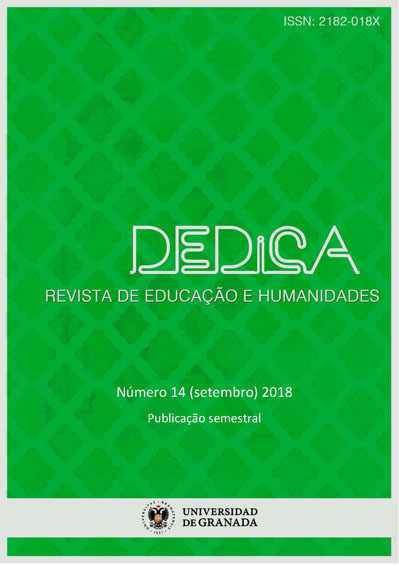Challenges and opportunities for Organizations to Communicate in the Sustainable Development Goals
DOI:
https://doi.org/10.30827/dreh.v0i14.7505Keywords:
Social Responsibility, Higher Education Institutions, Sustainable Development Goals (SDG)Abstract
Corporate Social Responsibility represents the incorporation of social and environmental concerns into an equation traditionally subordinated to the economic logic of profit. This integration led to the emergence of new organizational management paradigms, guided by a narrative that calls for an economy at the service of life (Laszlo, Sroufe and Waddock, 2017). Higher education institutions, which form the leaders of tomorrow, are no different, as they also have important and unique impacts on society in general, and on the communities in which they are inserted, in particular. However, it adds a unique and differentiating element that lies in its ability to produce knowledge and promote learning (Vallaeys, 2009). It highlights the challenges and opportunities that SDG brings to organizations, in general, and to higher education institutions, in particular.
Downloads
References
Ananiadou, K.; Claro, M. (2009). 21st Century Skills and Competences for New Millennium Learners in OECD Countries. OECD Education Working Papers, No. 41, OECD Publishing. doi.org/10.1787/218525261154
Annan-Diab, F.; Molinari, C. (2017). Interdisciplinarity: Practical approach to advancing education for sustainability and for the Sustainable Development Goals. The International Journal of Management Education 15 (2017) pp. 73 - 83 http://dx.doi.org/10.1016/j.ijme.2017.03.006
Batle, R. (2018, Maio) Aprendizagem em serviço – uma bússula para orientar o talento. Comunicação na Conferência “Everyone a Changemaker”, Escola Superior de Educação do Instituto Politécnico de Leiria, Leiria.
CCE – Comissão das Comunidades Europeias (2001). Livro Verde Promover um quadro europeu para a responsabilidade social das empresas. Bruxelas: CCE.
CE – MEMO/11/730 (de 25 de Novembro de 2011). Corporate Social Responsibility: a new definition, a new agenda for action. Recuperado em http://europa.eu/rapid/press-release_MEMO-11-730_en.htm.
Cortina, A. (2011). Los valores de uma ciudadanía activa. In Toro, B & Tallone, A. (Coords.). Metas educativas para 2021: La educación educative que queremos para la generación de los Bicentenários. Madrid: Org. de los Estados Iberoamerianos para la educación, la ciência y la cultura e Fundación SM, pp. 95-108
Davidson, N.; Major, C. H. (2014). Boundary crossings: Cooperative learning, collaborative learning, and problem-based learning. Journal on Excellence in College Teaching, 25(3/4), 7-55
Giacalone, R. (2006). Business Ethics and Social Responsibility Education: Shifting the worldview. Academy of Management Learning & Education, vol 5, nº 3, pp. 266-277
GRACE & Instituto ETHOS (2005). As empresas e os Objectivos de Desenvolvimento do MIlénio. Recuperado em http://www.grace.pt/conteudos/00/04/00/00/As-Empresas-e-os-Objectivos-de-Desenvolvimento-do-Mil%C3%A9nio_5117.pdf
Jinsong, W.; Song, G.; Huawei, H., William, L. & Yong, X. (2018). Information and Communications Technologies for Sustainable Development Goals: State-of-the-Art, Needs and Perspectives. IEEE (This article has been accepted for publication in a future issue of this journal but has not been fully edited. Content may change prior to final publication), pp. 1-18.
Jonker, J.; de Witte, M. (2006). Conclusion: The real challenges of Lorganizing and implementing CSR. In Jonker e de Witte (Ed.) The challenges of Organizing and Implementing Corporate Social Responsibility (pp. 237-247). New York: Palgrave Macmillan
Kearins, K.; Springett, D. (2003). Educating For Sustainability: Developing Critical Skills. Journal of Management Education 2003 (27), pp. 188-204. DOI: 10.1177/1052562903251411
Laszlo, C.; Sroufe, R. & Waddock, S. (2017). Torn between two paradigms: a struggle for the soul of Business Schools. AI Practitioner, 19 (2), 108-119. doi: 10.12781/978-1-907549-31-1-12
ONU (2015). Transforming our world: the 2030 Agenda for Sustainable Development. Resolução adotada na Assembleia Geral de 25 de Setembro de 2015.
Portela, P. (2018, Maio) Changemakers e as Novas Ciências. Comunicação na Conferência “Everyone a Changemaker”, Escola Superior de Educação do Instituto Politécnico de Leiria, Leiria.
PRME (2018). Our 2030 Vision. Acedido em http://www.unprme.org/about-prme/index.php
Storey, M.; Killian, S. & O'Regan, P. (2017). Responsible management education: Mapping the field in the context of the SDGs. The International Journal of Management Education 15, pp 93-103. http://dx.doi.org/10.1016/j.ijme.2017.02.009
UNGC (s/data). Portal do United Nations Global Compact (em port. Pacto Global das Nações Unidas). Recuperado de https://www.unglobalcompact.org/what-is-gc/mission/principles
UNGC (2016). Making Global Goals Local Business. Nova Iorque: UNGC
UNGC (s/data). Portal de United Nations Global Compact. Recuperado de: https://www.unglobalcompact.org/what-is-gc/mission/principles
Vallaeys F.; de la Cruz, C. & Sasia, P. (2009). Responsabilidad Social Universitaria: Manual de primeiros pasos. Mexico: McGraw-Hill Interamericana.
Voogt J.; Roblin N. (2012). A comparative analysis of international frameworks for 21st century competences: Implications for national curriculum policies. J. Curriculum Studies, 44 (3), 299–321. doi.org/10.1080/00220272.2012.668938
Weybrecht, G. (2017). From challenge to opportunity - Management education's crucial role in sustainability and the Sustainable Development Goals - An overview and framework. The International Journal of Management Education 15, pp 84-92. http://dx.doi.org/10.1016/j.ijme.2017.02.008
Wisokinska, Z. (2017). Millenium Development Goals/UN And Sustainable Development Goals/UN As Instruments For Realising Sustainable Development Concept In The Global Economy. Comparative Economic Research, Volume 20, Number 1, 2017 10.1515/cer-2017-0006, pp. 101-118.












